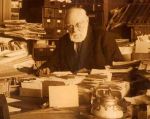
Co-founder of the UIA
"Everything in the universe, and everything of man, would be registered at a distance as it was
produced. In this way a moving image of the world will be established, a true mirror of his memory.
From a distance, everyone will be able to read text, enlarged and limited to the desired subject,
projected on an individual screen. In this way, everyone from his armchair will be able to contemplate
creation, as a whole or in certain of its parts."
- Paul Otlet
Paul Otlet (23 August 1868 - 10 December 1944) was born in Brussels, Belgium. He studied at the Free University of Brussels, where he earned a law degree in 1890. He went on to clerk with famed lawyer Edmond Picard, a friend of his father's. He soon became dissatisfied with his legal career, and began to take an interest in bibliography.
In 1891, Otlet met Henri La Fontaine, a fellow lawyer with shared interests in bibliography and international relations. In 1895, Otlet and La Fontaine began the creation of a collection of index cards, meant to catalog facts, that came to be known as the Répertoire Bibliographique Universel (RBU), or the Universal Bibliographic Repertory. By the end of 1895 it had grown to 400,000 entries, which later reached over 15 million. In 1904, Otlet and La Fontaine began to publish their classification scheme, which they termed the Universal Decimal Classification.
Otlet devoted his professional life to collecting, recording, organizing and disseminating knowledge. He dreamt of a world where human knowledge would be interlinked and available to everyone worldwide. In 1896, he set up a fee-based service to answer questions by mail, by sending the requesters copies of the relevant index cards for each query. By 1912, this service responded to over 1,500 queries a year. Otlet envisioned a copy of the RBU in each major city around the world, with Brussels holding the master copy.
Otlet's concepts foreshadowed what ultimately became the World Wide Web. His vision of a network of knowledge was based on documents and included notions of hyperlinks, search engines, remote access, and networks. More precisely, Paul Otlet envisioned a moving desk in the shape of a wheel, powered by a network of spokes beneath a series of moving surfaces. The purpose of this machine would be to allow users to search, read and write to a database stored on millions of 3X5 index cards. This new research environment would also allow researchers to annotate the relationships between one document and another. He imagined a day when users would access the database from great distances by means of an "electric telescope" connected through a telephone line, retrieving an image to be projected remotely on a flat screen. In his time, this idea of networked documents was still so novel that no one had a word to describe these relationships, until he invented one: "links".
Otlet is the co-founder of the Institut International de Bibliographie along with Henri La Fontaine. He was also an idealist and peace activist, pushing internationalist political ideas that were embodied in the League of Nations and its International Institute of Intellectual Cooperation (forerunner of UNESCO), working alongside La Fontaine to achieve their ideas of a new world polity that they saw arising from the global diffusion of information and the creation of new kinds of international organization.
Selected works by Paul Otlet:
- La Fin de la guerre: traité de paix générale basé sur une charte mondiale déclarant les droits de l'humanité et organisant la confédération des états (1914)
- Constitution mondiale de la Société des Nations: le nouveau droit des gens (1917)
- La Banque internationale: économie mondiale et société financière des nations (1929)
- Traité de documentation (1934)
- Monde: Essai d'universalisme (l935)
